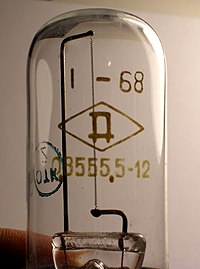
Photo from wikipedia
Development of efficient electrocatalysts usually relies on half‐cell electrochemical tests for rapid material screening, which however are not always consistent with the associated full cell evaluation. This study designs a… Click to show full abstract
Development of efficient electrocatalysts usually relies on half‐cell electrochemical tests for rapid material screening, which however are not always consistent with the associated full cell evaluation. This study designs a tensile‐strained Pd anode and reveals that with a lower apparent activity toward the hydrogen oxidation reaction as compared to the unstrained one, it exhibits a surprisingly high activity in proton exchange membrane fuel cells (PEMFCs). With an ultralow Pd loading of 4.5 µg cm−2, the tensile‐strained Pd achieves a maximum power density of 1048 mW cm−2, indicating a 30‐fold improvement in power efficiency than that of commercial Pd/C, nearly four times of that of the unstrained one. This discrepancy can be ascribed to the hydrogen‐rich surface in the H2 atmosphere of PEMFCs owing to the accelerated hydrogen “spill‐over” in the tensile‐strained Pd with a standout hydrogen storage property.
Journal Title: Small Methods
Year Published: 2022
Link to full text (if available)
Share on Social Media: Sign Up to like & get
recommendations!